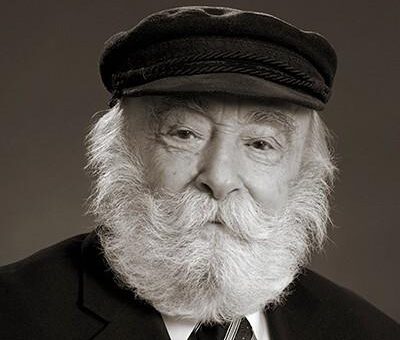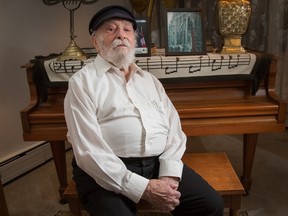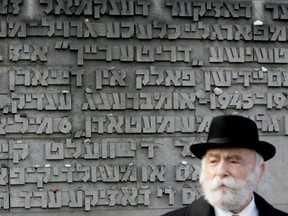An Epic Odyssey
 |
| Cantor Moshe Kraus |
"I sang it, and unbelievable, he [Commandant Josef Kramer, the Beast of Belsen] cried. I couldn’t believe it, he can cry.""That murderer, that nothing–I don’t have the words—‘murderer’ is a compliment for him. For him, killing a person was like killing a fly.""If he was going for a walk and saw a Jew, he would shoot him. He would go to see if the bullet hit right in the middle [of the forehead]. And if it wasn’t in the middle, he said a very nasty word.""When they hanged him, I cried. He saved my life. And I can’t forgive [myself] till today why I cried."Moshe Kraus, Holocaust survivor, Cantor
The first of nine children born in Uzhhorord, then a border town in Czechoslovakia, now part of Ukraine, his parents were Hasidic Jews. When he was all of eight years old, one Saturday Moshe raised his voice to sing Shabbat songs with the men in his village. "My amazing alto singing voice had been discovered", he remarked of the silence that followed his singing, he wrote in his autobiography, The Life of Moshele Der Zinger: How Singing Saved My Life.
The Jews of eastern Europe soon became aware of a "wunderkind" among them as he began travelling widely to sing on Shabbat and to give concerts. At age 18 he was hired as the chief cantor of Sighet, a Hungarian town with five synagogues. In his choir another young man sang with whom he would become lifelong friends; Peace activist and novelist, Holocaust survivor and Nobel Peace Prize winner Elie Wiesel. At 19 Cantor Kraus was appointed chief cantor of Budapest.
Moshe Kraus had received professional training at the Vienna Conservatory where he happened to be on November 1938 during Kristallnacht, the pogrom that launched Nazi Germany's agenda of murderous Jewish persecution that would ultimately result in the genocidal annihilation of six million of Europe's Jewish population. He witnessed Vienna's main synagogue in flames.
At the start of the Second World War, Jews were deported even as rumours began circulating that Jews were being slaughtered by the Nazis. He was deported in 1943 for slave labour in a Serbian copper mine, the Bor Labour camp. He spent nine months of labour there before he was sent to a coal-mining camp in southwestern Poland, Katowice. He was next shipped to Bergen-Belsen in northern Germany.
In Bergen-Belsen he became prisoner A855. There, at age 21, already experienced widely throughout Europe as a highly regarded cantor, he sang to his fellow prisoners to try to raise their spirits, to produce a diversion from the misery that life had become -- however briefly a relief from the reality of starvation, disease and death. His repertoire turned to popular Jewish songs of the day. "I began to go from barrack to barrack, singing, singing, singing", he explained.
 |
| A 2017 file photo of Moshe Kraus, a well-known cantor in the Jewish community in Ottawa. Photo by Wayne Cuddington /Postmedia |
He spoke six languages, among them German. When his performances reached the ears of the camp commandant, SS Capt. Josef Kramer, he was brought before the man who demanded to know whether he could sing in German. Responding that he was familiar with the songs of a popular Austro-Hungarian tenor, Cantor Kraus sang two of Joseph Schmidt's songs. "Would you believe it? This murderer -- he could kill a man like nothing -- he cried!"
He was henceforth to return on Sundays to sing, and in exchange Cantor Kraus was rewarded with scraps of food, a situation that he credited with saving his life, allowing him to survive the deadly Bergen-Belsen. Even so, conditions at the camp by early 1945 rapidly deteriorated as prisoners from other camps were moved west to Bergen-Belsen. Little food was available and soon typhus, dysentery and tuberculosis spread.
By the time British forces liberated Bergen-Belson on April 15, 1945, Cantor Kraus weighed 77 pounds. He remembers a British soldier picking him up, shouting, "Victory! Victory!" And then he woke up in a hospital. Following his recovery he went to work for a Jewish relief organization, returned to Bucharest to search for his family where he found that his father, mother and five of his siblings had perished. He moved to British-mandate Palestine, joined the Israeli army, and learned to assemble and disassemble tanks.
He also was invited to become the Israel Defense Forces first chief cantor for the next four years. From there he sang at major synagogues in Antwerp, Johannesburg, Mexico City and Ottawa. In his travels he gave concerts in places from Glasgow to Istanbul, Miami to Leningrad. An extraordinary man who lived an extraordinary life in extraordinary times.
His life ended on May 29, at age 100, when he died in Ottawa where he was cantor at the city's oldest synagogue, Congregation Beth Shalom, and where he and his wife Rivka had lived since 1975.
 |
| Moshe Kraus, a survivor of the Bergen-Belsen concentration camp during the Second World War, stands outside the Bergen-Belsen Memorial before it was officially opened in October 2007. Photo by NIGEL TREBLIN /AFP/Getty Images |
Labels: Cantor Moshe Kraus, Holocaust Survivors, In-Memoriam
0 Comments:
Post a Comment
<< Home